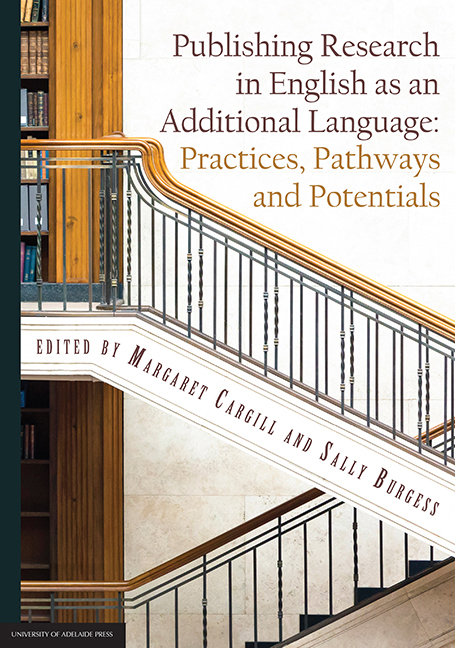Book contents
- Frontmatter
- Contents
- List of contributors
- Acknowledgements
- Foreword
- Introduction: Unpacking English for Research Publication Purposes [ERPP] and the intersecting roles of those who research, teach and edit it
- 1 Accept or contest: A life-history study of humanities scholars’ responses to research publication policies in Spain
- 2 Introducing research rigour in the social sciences: Transcultural strategies for teaching ERPP writing, research design, and resistance to epistemic erasure
- 3 Blurring the boundaries: Academic advising, authors’ editing and translation in a graduate degree program
- 4 The delicate art of commenting: Exploring different approaches to editing and their implications for the author-editor relationship
- 5 The CCC Model (Correspondence, Consistency, Correctness): How effective is it in enabling and assessing change in text-editing knowledge and skills in a blended-learning postgraduate course?
- 6 How credible are open access emerging journals? A situational analysis in the humanities
- 7 Disseminating research internationally: Intra-subdisciplinary rhetorical structure variation in immunity and allergy research articles
- 8 Scientists publishing research in English from Indonesia: Analysing outcomes of a training intervention to inform institutional action
- 9 ‘The one who is out of the ordinary shall win’: Research supervision towards publication in a Chinese hospital
- 10 The geopolitics of academic plagiarism
- 11 Training ‘clerks of the [global] empire’ for 21st-century Asia? English for Research Purposes (ERP) in Vietnam
- 12 Standardisation and its discontents
- Reflections and future directions in publishing research in English as an Additional Language: An afterword
1 - Accept or contest: A life-history study of humanities scholars’ responses to research publication policies in Spain
Published online by Cambridge University Press: 16 March 2018
- Frontmatter
- Contents
- List of contributors
- Acknowledgements
- Foreword
- Introduction: Unpacking English for Research Publication Purposes [ERPP] and the intersecting roles of those who research, teach and edit it
- 1 Accept or contest: A life-history study of humanities scholars’ responses to research publication policies in Spain
- 2 Introducing research rigour in the social sciences: Transcultural strategies for teaching ERPP writing, research design, and resistance to epistemic erasure
- 3 Blurring the boundaries: Academic advising, authors’ editing and translation in a graduate degree program
- 4 The delicate art of commenting: Exploring different approaches to editing and their implications for the author-editor relationship
- 5 The CCC Model (Correspondence, Consistency, Correctness): How effective is it in enabling and assessing change in text-editing knowledge and skills in a blended-learning postgraduate course?
- 6 How credible are open access emerging journals? A situational analysis in the humanities
- 7 Disseminating research internationally: Intra-subdisciplinary rhetorical structure variation in immunity and allergy research articles
- 8 Scientists publishing research in English from Indonesia: Analysing outcomes of a training intervention to inform institutional action
- 9 ‘The one who is out of the ordinary shall win’: Research supervision towards publication in a Chinese hospital
- 10 The geopolitics of academic plagiarism
- 11 Training ‘clerks of the [global] empire’ for 21st-century Asia? English for Research Purposes (ERP) in Vietnam
- 12 Standardisation and its discontents
- Reflections and future directions in publishing research in English as an Additional Language: An afterword
Summary
Introduction
The adoption of globalised forms of knowledge production in a climate of economic downturn has led to greater pressures being brought to bear on academics in many contexts around the world. Access to research funding, academic status, promotion and employment security are dependent on providing evidence of research productivity. The pressure to quickly and objectively assess and compare scholars, who compete for everscarcer resources, has led to a situation in which academic evaluation agencies are likely to look to quantifiable measures of research productivity, both in terms of output and in terms of the value of that output and the quality of the research. The most obvious evidence of the impact of a scholar's research, and ostensibly of its quality, is acceptance for publication in an elite journal and the number of citations accrued. It is well known that research publications in English attract a wider readership than do publications in other languages and that, as a result, these publications are more likely to garner citations (see, for example, Whitehand, 2005, and Ramos-Torre & Callejo-Gallego, 2013). Therefore, when research quality is measured in terms of citations, publication in English is implicitly favoured and publication in other languages can become a dispreferred option.
Although the view that non-first-language users of English face an anglophone bias when presenting their work for publication is often challenged (Swales, 2004; Casanave, 2009; Hyland, 2016a, 2016b), few would suggest that the status of English as the current lingua franca of international academic communication does not present users of other languages and of English as an additional language [EAL] with a greater challenge than that faced by those for whom it is a mother tongue. Scholars whose first language is not English devote more time and economic resources to producing publications than do their anglophone counterparts (Ammon, 2000, 2001). Funds may be used to pay for language training or periods of time spent in English-speaking countries. Once scholars have achieved competence in English, many continue to rely at least partially on support (usually paid) from specialised translators, editors and other ‘literacy brokers’ (Lillis & Curry, 2006; Chan, 2016). Journal editors and peer reviewers may recommend that EAL authors avail themselves of these services, especially those offered by first-language users of English, to revise their papers (Lillis & Curry, 2015).
- Type
- Chapter
- Information
- Publishing Research in English as an Additional LanguagePractices, Pathways and Potentials, pp. 13 - 32Publisher: The University of Adelaide PressPrint publication year: 2017



